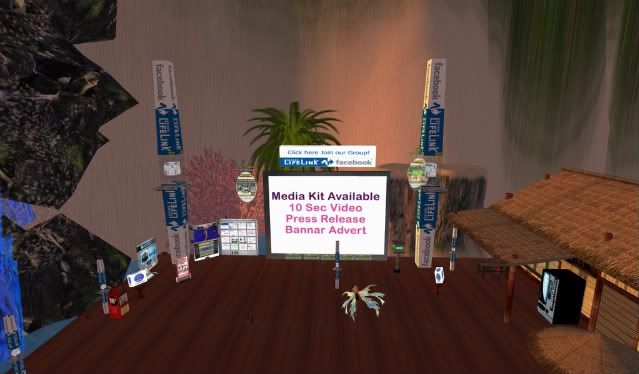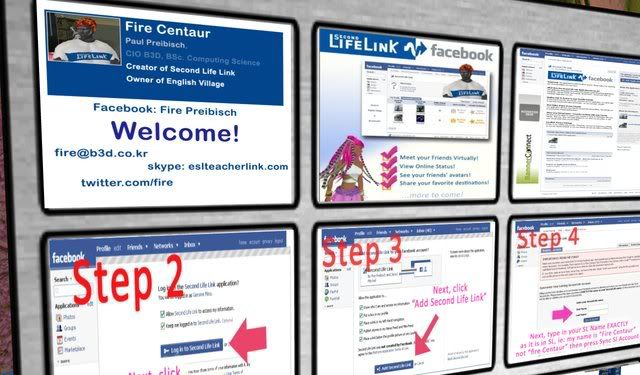Leggendo, un po' distrattamente, le ultime polemiche riportate nel forum, mi sono imbattuta in qualche post interessante tra cui quello che riportava una di Cory Ondreja cofondatore di SecondLfe (ex Cory Linden):
http://www.oreillynet.com/fyi/blog/2008/02/cory_ondrejka_teaching_about_s.html
http://ondrejka.blogspot.com/2008/02/apoc-week-5.html
lo riporto (per i pigrissimi) ma conviene cliccare sul link sia per l'audio che per le slide
http://www.oreillynet.com/fyi/blog/2008/02/cory_ondrejka_teaching_about_s.html
***********************************************************************************
O'Reilly FYI
--------------------------------------------------------------------------------
The History of Second Life According to Cory Ondrejka
listen Friday February 15, 2008 11:30AM
by Sara Peyton
Cory Ondrejka, cofounder of Second Life, is spending the spring as a visiting professor at the Annenberg School for Communication at USC. And he’s sharing some of his experiences on his blog. Recently he put together a slide show on the history of Second Life for a faculty seminar.
“It runs a bit long, but I had a lot of fun doing Google archeology,” writes Cory. “Sadly, there is very little content from the early Alpha and Beta period, so I hope more of that makes it onto the web.”

Read Cory’s post.
***********************************************************************************
Wednesday,
February 13, 2008
apoc week 5This week at USC was both my second faculty seminar and
5th APOC class. The students' first significant papers were due and most gave short presentations. For the faculty seminar, since my first talk had generate a fair amount of Second Life-specific interest -- and inspired by James' new book -- I decided
to use the history of SL as a backdrop for the themes, behaviors, activities, and topics worthy of further study and exploration. It runs a bit long, but I had a lot of fun doing Google archeology. Sadly, there is very little content from the early Alpha and Beta period, so I hope more of that makes it onto the web.
View Upload your own
The student's module papers were their opportunity to focus on the first four weeks --
online communities, niche communities, virtual worlds, and journalism -- and tug on some thread that had caught their interest. I hope more of them end up online, as they are quite good. Lightning round tour of interesting thoughts from students:
Until recently, usage time on social networking sites have been declining.
Facebook and LinkedIn have still grown. Is this a sign of social network fatigue?
Amusingly, Facebook just posted a sharp increase in their usage time, reversing the trend. Political interest perhaps?
Is anyone using Twitter for non-business use?
Outside of the geekosphere, Twitter and microblogging are not yet making an impact, although some use cases do exist.
Twitter, in particular, is losing credibility through outages and lack of transparency around usage.
Even as newspapers attempt to shift to online ads, current trend lines indicate 10 years before online revenue grows enough to replace offline.
Trends will get worse, because of continued generational shift away from offline reading.
Mostly led by the brilliant Jeremy Bailenson's group at Stanford, a ton of research is continuing to support how strongly we connect to our avatar representation.
Huge implications for trust, learning, and training online.
Whyville makes some good steps toward being
a strong learning platform, and tries to offer
protections for young users.
What happens when hyperlocal meets collective intelligence? Innovative media organizations are trying to find better ways to balance information flow between citizen journalists and media organizations to generate local media options that never existed before, particularly in more
rural areas.
We also had a guest speaker, Gregory Markel, the president of Infuse Creative, a SEO/SEM company. Very bright, compelling guy. Plus, he was a rock star. He did a great job of synopsizing current
best practices of search engine optimization. We were chatting afterwards about
search in Second Life and he thought the direction our new search was going sounded like good steps, although we agreed there is a rich opportunity to add more behavior data into the search mix.
Posted by cory ondrejka



























 Flickr/eleonoraporta
Flickr/eleonoraporta Myspace/eleonora_porta
Myspace/eleonora_porta Twitter/eleonoraporta
Twitter/eleonoraporta YouTube/username
YouTube/username Del.icio.us/eleonora.porta
Del.icio.us/eleonora.porta Wikipedia/eleonoraporta
Wikipedia/eleonoraporta GMail/Eleonora Porta
GMail/Eleonora Porta Technorati/eleonoraporta
Technorati/eleonoraporta Blog/Eleonora Porta
Blog/Eleonora Porta


